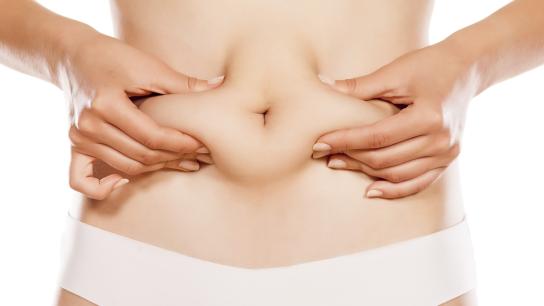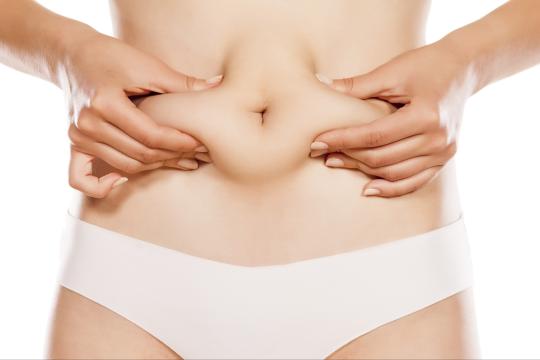
You work. You sweat. You religiously avoid the pre-meal bread basket, multiple happy hour cocktails, and anything resembling a dessert. Let's face it, you've denied yourself a lot of livin' trying to ditch that stubborn tummy pooch hanging around your waistline like a ball-n-chain. If the "learning to live with it" route hasn't been quite your cup of tea, maybe you're considering joining the 150,000+ patients who opt each year to have a tummy tuck. And if you are one of those considering this ever-popular approach to a sagging tummy, then this post is for you. Abdominoplasty (the official term for a tummy tuck) procedures come with a lot of questions—as they should and as should any plastic surgery procedure. So without further ado, let's take a look at some of the top questions that patients ask when they're considering having a tummy tuck procedure.
What would an ideal candidate for a tummy tuck look like?
An ideal candidate for a tummy tuck procedure should be able to tick off many of the checkmarks required for most surgical procedures—be pretty-darned healthy, be positive and educated about their pending procedures, have realistic expectations, and not be a smoker. Smoking slows down the healing process and can lead to heightened risk during surgical procedures, so if you are a smoker, you'll be advised to knock it off at least 6 weeks prior to your procedure. Your surgeon will advise you on this one, and gosh darn it, you'll listen.
In addition to those basics, ideal tummy tuck candidates should already be within 20% of their ideal body weight. If you were thinking that a tummy tuck was your ticket to significant weight loss, you were wrong. A tummy tuck can successfully remove excess skin, loose muscle and some excess fat. Those fun perks that come with pregnancy, massive weight loss, prior surgery, or just the gruesome twosome... heredity and age.
Should you lose weight before your procedure?
Like all issues related to surgery, you will seek out the wise council of your board-certified plastic surgeon. *wink. That being said, your surgeon may advise you to lose weight prior to your procedure to reduce any excess fat surrounding your internal organs. Since an ideal candidate would be within 20% their ideal body weight anyways, this all makes sense, no? And if your doctor suggests losing some lbs. to make you a more ideal candidate for a tummy tuck, then that’s exactly what you’ll do.
Is a tummy tuck only for females post-pregnancy?
Nope. Any patient who's a good candidate, with excess skin, loose muscle and some diet resistant fat they'd like to be rid of is invited to this party. Patients who undergo weight loss surgery? If they're good candidates and their weight has stabilized, they're in. Men and women who’ve lost weight through diet and exercise or from surgery? They’re in too. Mamma's looking to lose the post-baby pooch? Yep. They're in. #inclusive.
Is liposuction involved in abdominoplasty?
Yep, sometimes. Your surgeon may utilize liposuction to remove any excess fat that’s present. They'll make sure you have a full understanding of the particulars of your procedure prior to surgery.
What type of anesthesia is used?
Most surgeons perform tummy tuck surgery using general anesthesia. Some surgeons use local anesthesia and sedation. Your surgeon will decide what anesthesia will be best for you.
How long is the procedure?
We know, we know. You're busy. A tummy tuck procedure varies according to the amount of surgery needed and your particular surgeon’s experience. In general, tummy tuck procedures can take 2-3 hours. It's surgery, you know? You're not going to want to rush this or your recovery .
Will a tummy tuck rid you of stretch marks?
Sometimes. Tummy tuck procedures can, in fact, remove stretch marks that rest below the belly button. #bonus. However, stretch marks that are above the belly button are there to stay, though they may be moved down depending on your individual procedure.
Are there scars after a tummy tuck?
Yes. As with all surgical procedures, there will be a scar — sorry, folks, but an incision equals a scar. Yet, while in general scars are permanent, they will likely fade with time. Your surgeon will always try to place the scar in the least obtrusive places — they’re good like that. The length and appearance of a tummy tuck scar will vary from patient to patient.
Is a tummy tuck a permanent solution or will the skin lose its firmness over time?
Tummy tuck results are permanent. But that doesn’t mean that your body will magically be able to withstand future aging, gravity, and/or weight gain. To enjoy your results for as long as possible, a healthy diet and exercise routine is a good idea.
How long can you wait after pregnancy before it's too late for the procedure to work?
While this question is a head scratcher... it's out there, so we’ve got an answer. It’s best to hold off on a tummy tuck until you’re done having kids and your body has stabilized from the changes it’s been through during pregnancy. After that, there's no time limit to when you can have a tummy tuck after giving birth.
Are there any alternatives to a tummy tuck that are as effective without anesthesia?
Nope. A tummy tuck procedure is really the gold-standard when it comes to removing excess skin, contouring fat and tightening loose muscle. A tummy tuck can flatten the tummy and narrow the waist at the same time. Yes, liposuction alone can remove fat, but skin shrinkage after liposuction varies from patient to patient, even when surgeons use ultrasound or laser to assist with the liposuction. And while there are also some devices that can be used to heat and shrink skin and fat, they don't necessarily remove the goods in the same way that a tummy tuck can.
So there it is, some basic facts to dispel a few popular tummy tuck questions that might have been spinning around in your head. If you're tired of that abdominal pooch and you're looking for a permanent answer, a sit-down with your board-certified plastic surgeon can help you decide if you're a good candidate for an abdominoplasty and if this procedure might be right for you.







